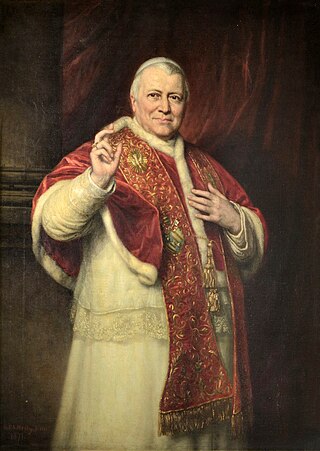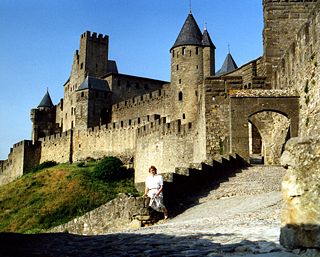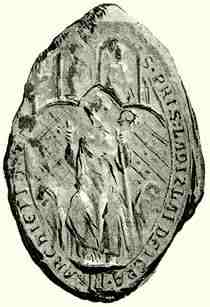Related Research Articles

William of Ockham or Occam was an English Franciscan friar, scholastic philosopher, apologist, and Catholic theologian, who is believed to have been born in Ockham, a small village in Surrey. He is considered to be one of the major figures of medieval thought and was at the centre of the major intellectual and political controversies of the 14th century. He is commonly known for Occam's razor, the methodological principle that bears his name, and also produced significant works on logic, physics and theology. William is remembered in the Church of England with a commemoration on the 10th of April.

Pope John XXII, born Jacques Duèze, was head of the Catholic Church from 7 August 1316 to his death, in December 1334. He was the second and longest-reigning Avignon Pope, elected by the Conclave of Cardinals, which was assembled in Lyon. Like his predecessor, Clement V, Pope John centralized power and income in the Papacy and lived a princely life in Avignon.

The Franciscans are a group of related mendicant Christian religious orders within the Catholic Church. Founded in 1209 by the Italian saint Francis of Assisi, these orders include three independent orders for men, orders for nuns such as the Order of Saint Clare, and the Third Order of Saint Francis open to male and female members. They adhere to the teachings and spiritual disciplines of the founder and of his main associates and followers, such as Clare of Assisi, Anthony of Padua, and Elizabeth of Hungary. Several smaller Protestant Franciscan orders exist as well, notably in the Anglican and Lutheran traditions.
The Fraticelli or Spiritual Franciscans opposed changes to the rule of Saint Francis of Assisi, especially with regard to poverty, and regarded the wealth of the Church as scandalous, and that of individual churchmen as invalidating their status. The Fraticelli were declared heretical in 1296 by Boniface VIII.
Michael of Cesena was an Italian Franciscan, minister general of that order, and theologian. His advocacy of evangelical poverty brought him into conflict with Pope John XXII.

Ubertino of Casale was an Italian Franciscan and one of the leaders of the Spirituals, the stricter branch of the Franciscan order.
Conciliarism was a reform movement in the 14th-, 15th- and 16th-century Catholic Church which held that supreme authority in the Church resided with an ecumenical council, apart from, or even against, the pope.
Apostolic poverty is a Christian doctrine professed in the thirteenth century by the newly formed religious orders, known as the mendicant orders, in direct response to calls for reform in the Roman Catholic Church. In this, these orders attempted to live their lives without ownership of lands or accumulation of money, following the precepts given to the seventy disciples in the Gospel of Luke (10:1-24), and succeeding to varying degrees. The ascetic Pope Paschal II's solution of the Investiture Controversy in his radical Concordat of 1111 with the Emperor, repudiated by the cardinals, was that the ecclesiastics of Germany should surrender to the imperial crown their fiefs and secular offices. Paschal proved to be the last of the Gregorianist popes.
The Dulcinians were a religious sect of the Late Middle Ages, originating within the Apostolic Brethren. The Dulcinians, or Dulcinites, and Apostolics were inspired by Franciscan ideals and influenced by the Joachimites, but were considered heretical by the Catholic Church. Their name derives from the movement's leader, Fra Dolcino of Novara, who was burned as a heretic on the orders of Pope Clement V.
William of Alnwick was a Franciscan friar and theologian, and bishop of Giovinazzo, who took his name from Alnwick in Northumberland.
Francis of Assisi founded three orders and gave each of them a special rule. Here, only the rule of the first order is discussed, i.e., that of the Order of Friars Minor.
Bonagratia of Bergamo was a Franciscan involved in the "poverty of Christ" controversy. As a trained canonist, he supported Michael of Cesena against Pope John XXII.

Bertrand de la Tour, also known as Bertrand de Turre, was a French Franciscan theologian and cardinal.
Francis of Marchia was an Italian Franciscan theologian and philosopher. He was an ally of William of Ockham and Michael of Cesena, and opponent of Pope John XXII, in the struggles of the Franciscan Spirituals, leading to his expulsion from the order in 1329. He was commenting on the Sentences of Peter Lombard around 1320, but no longer closely bound to Lombard; for example he incidentally theorises on projectile motion, views now thought to be taken from Richard Rufus of Cornwall. He was nicknamed Doctor succinctus.

Papal infallibility is a dogma of the Catholic Church which states that, in virtue of the promise of Jesus to Peter, the Pope when he speaks ex cathedra is preserved from the possibility of error on doctrine "initially given to the apostolic Church and handed down in Scripture and tradition". It does not mean that the pope cannot sin or otherwise err in most situations. This doctrine, defined dogmatically at the First Vatican Council of 1869–1870 in the document Pastor aeternus, is claimed to have existed in medieval theology and to have been the majority opinion at the time of the Counter-Reformation.
Gauscelin de Jean was a French cardinal.

Jean de Beaune was a Dominican inquisitor in Carcassonne during the early 14th century who played a role in precipitating the Apostolic poverty controversy of the period.

Nicholas of Freising, commonly known as Nicholas the Minorite, was a member of the Franciscan Order during the early 14th Century. He is presumed to be the author of the Chronicle of Nicholas the Minorite, an account of the conflict over Apostolic poverty under the reign of Pope John XXII. The Chronicle was written or assembled as early as 1338.

Ladislaus Jánki was a Hungarian Franciscan friar and prelate in the first half of the 14th century, who served as Archbishop of Kalocsa and chancellor of the royal court from 1317 until his death. He was considered a faithful partisan of Charles I of Hungary.
John of Naples, also known as Giovanni Regina, was a Dominican friar and prominent Thomist theologian and philosopher in the early 14th century.
References
- 1 2 Melanie Brunner, 'Pope John XXII and the Michaelists: The Scriptural Title of Evangelical Poverty in Quia vir reprobus', Church History and Religious Culture, 94 (2014), 197–226, doi : 10.1163/18712428-09402002.
- ↑ Jones, John D., The Poverty of Christ and the Apostles, PIMS, 1999, Intro p. 2 ISBN 9780888442871